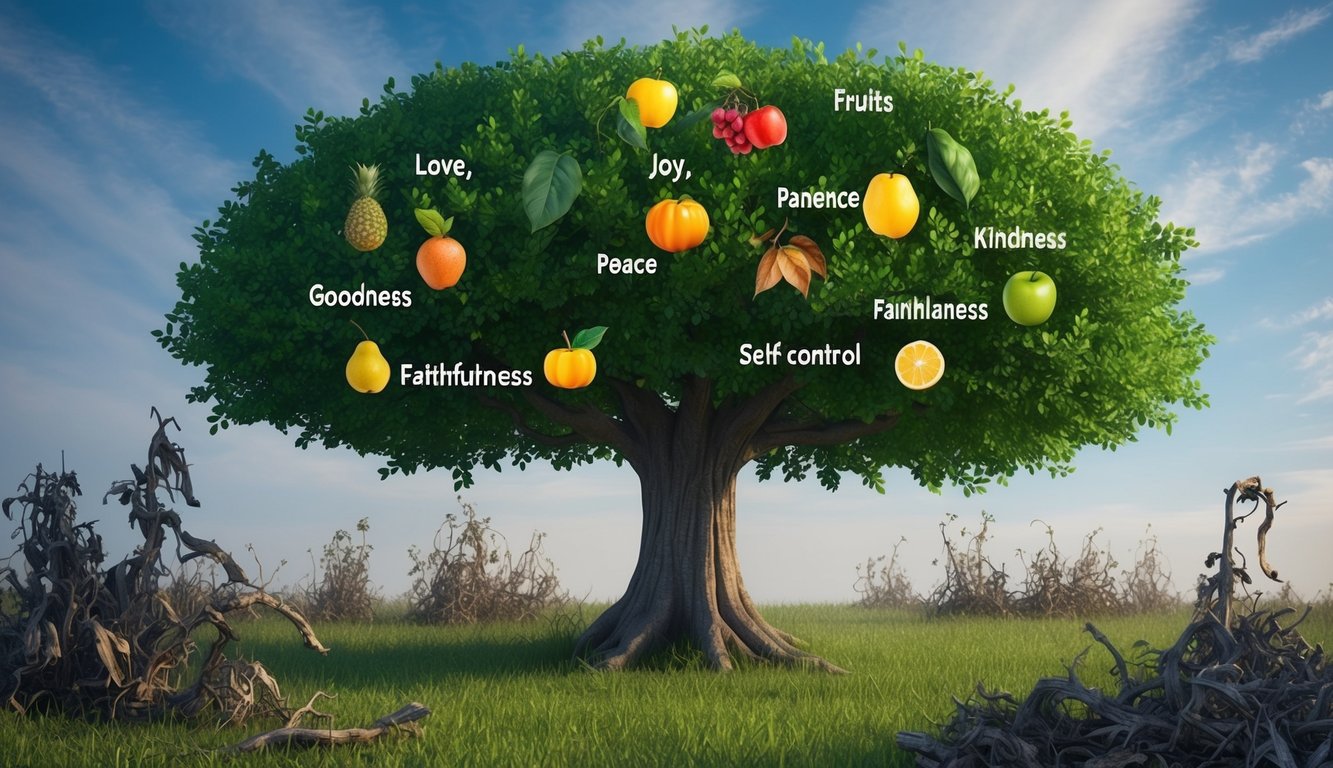Don’t Miss Out On This Unique Astrological Opportunity
Are you tired of spinning your wheels and getting nowhere? Simply put, you’re out of sync: you’re out of alignment with your astral configuration.
But: there’s a kind of map that can help you reclaim your alignment. Think of it as your own personal blueprint to success and happiness: a blueprint that will help you live your most amazing life.
Get started here.
When you think about living a meaningful and positive Christian life, you might come across the term “Fruit of the Spirit.” This concept, found in Galatians 5:22-23, refers to the nine qualities that believers should embody, which include love, joy, peace, patience, kindness, goodness, faithfulness, gentleness, and self-control. These qualities reflect the presence of the Holy Spirit in your life and help you grow spiritually.
Imagine these fruits as a guide to becoming more Christ-like.
If you strive to nurture these traits, you open the door to living in harmony with others and experiencing inner peace.
Engaging with these virtues can deepen your faith and lead to a more fulfilling Christian journey.
By exploring how these spiritual fruits can impact daily living, you can find encouragement and inspiration in your own faith.
As you read further, you’ll discover practical ways to nurture and grow each fruit in your life, allowing the teachings of the Holy Spirit to flourish within you.
Understanding the Fruit of the Spirit
When exploring the concept of the Fruit of the Spirit, it’s important to consider its biblical roots and the specific traits that define it.
These traits are vital for a deeper understanding of a Christian life filled with purpose and faith.
Biblical Context and Significance
The Fruit of the Spirit is found in the New Testament, specifically in the book of Galatians.
The Apostle Paul writes about these traits, describing them as qualities that God nurtures within you.
This biblical reference highlights the importance of these attributes in your life as a Christian.
The concept signifies spiritual growth and maturity.
By bearing these fruits, you live a life that aligns with the teachings of Christ.
Such alignment is central to your journey of faith and brings you closer to God.
The Fruit of the Spirit is not just a list of qualities, but a guide to living a life that is pleasing to God.
Characteristics of the Fruit
The Fruit of the Spirit consists of several distinct qualities: love, joy, peace, patience, kindness, goodness, faithfulness, gentleness, and self-control.
These are seen as markers of spiritual maturity and are nurtured by the Holy Spirit within you.
Each characteristic has unique significance.
For instance, love embodies selflessness, while patience reflects endurance during challenges.
Kindness and goodness show through compassionate actions, and self-control represents discipline over desires.
As you cultivate these traits, you find that they enhance your personal and spiritual life, aligning you closer with biblical teachings.
They are essential for a fulfilling Christian life.
The Nine Attributes of the Fruit
The fruits of the Spirit embody the Christian ideals that guide how you interact with others and nurture your spiritual growth.
These attributes serve as a path for living a Christlike life.
Love – Agape
Love, or Agape, is more than just a feeling.
It’s an unconditional love that you give to others, reflecting the love Christ has for you.
This type of love involves selfless actions and a desire to help others without expecting anything in return.
In your daily life, practicing Agape means showing kindness and compassion, even when it’s difficult.
It is a key aspect of living a life deeply rooted in Christian values and can be seen in acts of service and empathy.
Joy – Chara
Joy, or Chara, is a deep-rooted happiness that isn’t based on circumstances.
Unlike fleeting pleasures, this joy stems from your relationship with God and the hope found in faith.
Despite challenges or hardships, Chara remains a steady source of contentment and positivity.
It empowers you to face life’s ups and downs with a hopeful heart.
When you cultivate this joy, it becomes easier to find the silver lining in difficult times and to remain thankful for your blessings.
Peace – Eirene
Peace, or Eirene, refers to a sense of wholeness and harmony in your life.
It is not just the absence of conflict, but a state of tranquility that comes from a strong connection with God.
This peace helps you to manage stress and maintain calmness even in chaotic situations.
By fostering Eirene, you can build stronger relationships and create a supportive community.
It emphasizes inner calm that extends to how you interact with others.
Patience – Makrothumia
Patience, or Makrothumia, involves enduring difficult situations or delays without frustration.
It means being slow to anger and accepting challenges with grace.
Patience allows you to give others the time and space to grow, understanding that everyone is on their own journey.
This quality strengthens your resolve and fosters a forgiving heart.
Through patience, you can navigate conflicts calmly and build understanding with those around you.
Kindness – Chrestotes
Kindness, or Chrestotes, is about showing generosity and compassion.
This quality requires you to think about others and act in their best interests.
Kindness is often shown through small acts, like helping someone in need or offering a comforting word.
It reflects God’s love in your life, encouraging you to make a positive impact wherever you go.
This attribute fosters a supportive and caring community, highlighting the importance of treating others with respect.
Goodness – Agathosyne
Goodness, or Agathosyne, involves living a life that reflects integrity and moral virtue.
It is about being upright and ethical in your actions.
This attribute guides you to make choices that benefit not just you, but also those around you.
Practicing goodness means standing for what is right, even when it’s difficult.
In your life, this can lead to a reputation for trustworthiness and honesty, building a strong foundation for personal and professional relationships.
Faithfulness – Pistis
Faithfulness, or Pistis, is about being reliable and loyal.
It means staying true to your commitments and demonstrating steadfastness in your relationship with God.
This attribute inspires you to be dependable in your relationships with others, fostering trust and respect.
By embodying faithfulness, you can strengthen your community and become a pillar of stability.
Maintaining this quality means keeping promises and being consistent in your thoughts, words, and actions.
Gentleness – Prautes
Gentleness, or Prautes, reflects a calm and mild demeanor.
It involves responding to others with patience and understanding.
This attribute is not about weakness; rather, it showcases strength in controlling your emotions and actions.
Practicing gentleness helps you to resolve conflicts peacefully and build meaningful relationships.
By showing a gentle spirit, you can become a source of comfort and support to those around you, promoting positive and harmonious interactions.
Self-Control – Egkrateia
Self-Control, or Egkrateia, is the ability to manage your desires and impulses.
It means having the discipline to make choices that align with your values.
Practicing self-control involves resisting temptations and staying focused on long-term goals.
This quality is vital for personal growth and spiritual development.
By fostering self-control, you can overcome challenges and maintain a healthy, balanced life.
It empowers you to live in alignment with your beliefs and aspirations.
Cultivating Spiritual Fruit in Life

Cultivating spiritual fruit involves prayer, strong faith, a close relationship with the Holy Spirit, and overcoming sin and temptation.
This journey helps you grow in Christian virtues and embrace the fruits of the Spirit.
Role of Prayer and Faith
Prayer is essential in spiritual growth.
It connects you with God, allowing you to seek guidance and strength.
When you pray regularly, you become more aware of your goals and the fruits of the Spirit you wish to cultivate.
Faith acts as a foundation, supporting your spiritual journey.
When your faith is strong, it becomes easier to embrace the Spirit’s gifts.
Prayer and faith work together, providing a way to express your hopes, struggles, and gratitude.
Building a Relationship with the Holy Spirit
To cultivate spiritual fruit, building a relationship with the Holy Spirit is crucial.
This bond requires openness to the Spirit’s presence in your life.
By inviting the Holy Spirit to guide you, you align your actions and thoughts with Christian values.
The Holy Spirit acts as a counselor and source of strength.
Listening for guidance and comfort helps deepen your connection.
Spending time in reflection and meditation allows you to better understand the Spirit’s role in your life.
Overcoming Sin and Temptation
Overcoming sin and temptation is a vital part of spiritual growth.
Recognizing the desires of the flesh and their impact helps you address them effectively.
Staying vigilant and aware of your weaknesses prepares you for moments of temptation.
Seeking support from fellow believers provides encouragement when you face struggles.
They can help you stay focused on cultivating virtues like patience, kindness, and self-control.
Embracing accountability strengthens your resolve and commitment to living a life enriched by the fruits of the Spirit.
Contrast with Works of the Flesh

This section explores the temptations that lead to sinful acts, highlighting their chaotic impact on spiritual growth and contrast with the fruits of the Spirit.
Defining the Acts of the Sinful Nature
The Bible describes acts of the sinful nature as behaviors that go against spiritual values.
These include jealousy, anger, and selfishness, leading to chaos in life.
The “works of the flesh” represent decisions driven by immediate desires rather than long-term spiritual well-being.
Such choices often lead to consequences that hinder personal growth and disconnect individuals from their higher purpose.
Understanding various spiritual symbols, such as the pentagram meaning and symbolism, can provide insight into the contrast between material temptations and spiritual enlightenment.
By seeking wisdom and self-discipline, one can overcome these impulses and align with a more fulfilling path.
Folks can find themselves drawn to these temptations for various reasons, including societal pressures or personal challenges.
Recognizing these behaviors is the first step to understanding how they diverge from the stability offered by the fruits of the Spirit.
By identifying these acts, you can begin working toward more positive choices.
The Impact of Sinful Behaviors on Spiritual Growth
Engaging in sinful behaviors creates barriers to spiritual development.
These acts may offer temporary satisfaction but often lead to inner turmoil and regret.
They distract from a faithful life and make it hard to experience peace and joy.
Chaos and confusion often follow these actions, clouding your ability to connect deeply with your faith.
To foster spiritual growth, it’s important to move away from these behaviors.
By focusing on nurturing the fruits of the Spirit instead, such as love and kindness, you can create a more meaningful and spiritually rewarding life.
Understanding this contrast can help guide you in making better choices.
Living Out the Fruit of the Spirit

Living out the Fruit of the Spirit means reflecting the qualities of the Character of Christ in your daily life.
This involves embracing virtues such as love, compassion, and forgiveness and applying them in practical ways.
Everyday Examples and Applications
In your daily life, you can show love by offering kind words, caring actions, and understanding to those around you.
Simply being there for a friend who is upset can reflect this fruit.
Forgiveness is another key aspect.
If someone wrongs you, releasing resentment and choosing to forgive can mirror the forgiveness you receive through your faith.
Letting go of grudges quickly can help you maintain peace.
Compassion could mean volunteering at a local shelter or helping a neighbor in need.
When you see others struggling, your willingness to lend a hand without expecting anything in return shows this fruit.
These traits can be practiced through your sincere efforts to be more like Christ in your actions and thoughts.
This will make your faith visible to others.



